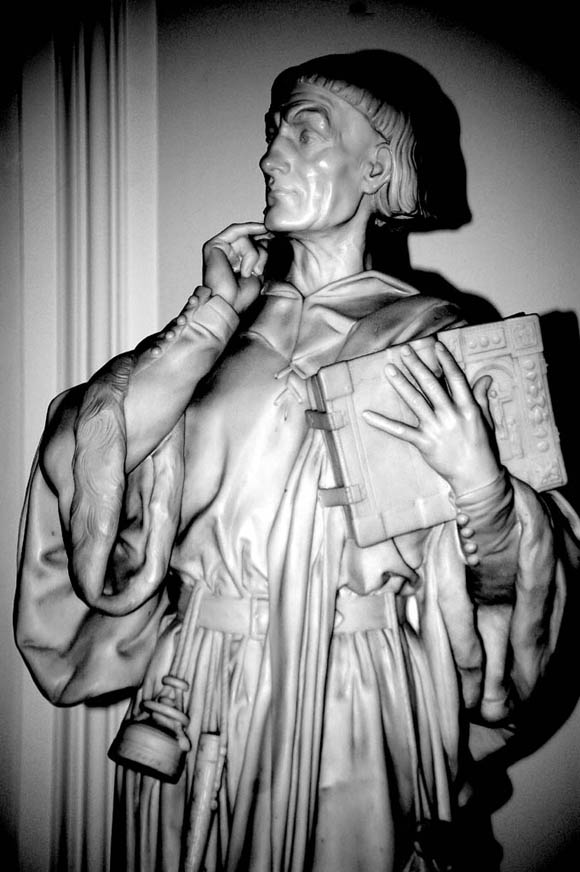
| Giraldus Cambrensis
Giraldus Cambrensis (c.1146 - c.1223), also known as Gerallt Gymro in Welsh or Gerald of Wales in English, was a medieval clergyman and chronicler of his times. Born in around 1146 at Manorbier Castle in Pembrokeshire, he was of mixed Norman and Welsh blood, his real name being Gerald de Barri.
Gerald was a nephew of the Bishop of St David's, and a grandson of Gerald de Windsor by his (de Windsor's) marriage to the notorious Nest, daughter of Rhys ap Tewdwr; the family also claimed a relationship with the family of The Lord Rhys (Rhys ap Gruffydd). Gerald of Wales had a church education at Gloucester, followed by a period of study in Paris. His expectations of succeeding his uncle as bishop in 1176 were dashed, possibly because of his Welsh blood. Despite this rejection, he became chaplain to King Henry II of England in 1184, and was chosen to accompany one of the king's sons, John, on an expedition to Ireland. This was the catalyst for his literary career, his account of his findings being published as Topographia Hibernica (1188). He followed it up, shortly afterwards, with an account of Henry's conquest of Ireland, the Expugnatio Hibernica.
Having thus demonstrated his usefulness, Gerald was selected to accompany the Archbishop of Canterbury, Baldwin of Exeter, on a tour of Wales in 1188, the object being a recruitment campaign for the Third Crusade. His account of that journey, the Itinerarium Cambriae (1191) was followed by the Descriptio Cambriae in 1194. His two works on Wales remain incredibly valuable historical documents, significant for their descriptions - however untrustworthy and inflected by ideology, whimsy, and his unique style - of Welsh and Norman culture. In 1198, another opportunity arose for Gerald to become Bishop of St David's, but his application was again rejected. He repeatedly but unsuccessfully challenged this decision, made by Hubert Walter, before giving up in 1203 to spend the remainder of his life in academic study, producing works of devotional instruction and politics. He died in about 1223, probably in Lincoln.
Gerald's writings reflect experiences gained on his travels as well as his knowledge of the authorities on learning. Repeatedly rejected for the bishopric of his beloved St David's, Gerald pleaded not only his own cause, but that of St David's as an archbishopric (and thus of the same status as Canterbury). He visited Rome on three occasions in support of his claims, but the Pope was reluctant to see a Welsh Church independent of Canterbury. Failing to be appointed to St David's, Gerald maintained that it was the fear of the effect that it would have on the national politics in Wales that prevented his appointment.
The Welshman's writings were prolific, but it is generally agreed that his most distinguished works are those dealing with Wales and Ireland, with his two books on his beloved Wales the most important: Itinerarium Kambriae and Descriptio Kambriae. Professor Davies tells us that Giraldus, whom he calls "an admirable story-teller," is the only source for some of the most famous of the Welsh folk tales including the declaration of the old man of Pencader to Henry II which concludes Descriptio Kambriae: "This nation, O King, may now, as in former times, be harassed, and in a great measure weakened and destroyed by your and other powers, and it will also prevail by its laudable exertions, but it can never be totally subdued through the wrath of man, unless the wrath of God shall concur. Nor do I think that any other nation than this of Wales, nor any other language, whatever may hereafter come to pass, shall on the day of severe examination before the Supreme Judge, answer for this corner of the earth."
It was Giraldus who also wrote (of the Welsh) that "If they would be inseparable, they would be insuperable," and that, unlike the English hirelings, who fight for power or to procure gain or wealth, the Welsh patriots fight for their country. He had pleasant things to say about the poetic talents of his people, too: "In their rhymed songs and set speeches they are so subtle and ingenious that they produce, in their native tongue, ornaments of wonderful and exquisite invention both in the words and the sentences... They make use of alliteration in preference to all other ornaments of rhetoric, and that particular kind which joins by consonancy the first letters or syllables of words."
Giraldus could not have predicted the later perfection of cynghanedd, the complex system of sound correspondence that has characterized the strict-meter poetry of the Welsh for so many centuries and that is still practised today, especially in competitions for the eisteddfod chair. Cynghanedd did not become a formal system with strict rules until the fourteenth century, but its uniquely Welsh forms had been honed for centuries before that. Finally, in Descriptio Kambriae, Giraldus penned the following words that give so much pride to Welsh singers of today, especially those who participate in the immensely popular Cymanfaoedd Ganu (hymn-singing festivals) held throughout Wales and North America:
In their musical concerts they do not sing in unison like the inhabitants of other countries, but in many different parts. . .You will hear as many different parts and voices as there are performers who all at length unite with organic melody.
|

